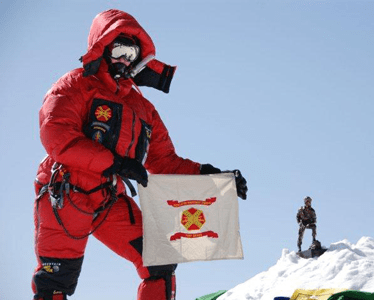
Can you imagine being one of only 90 women in the entire world who summited our globe’s tallest mountain, Mount Everest?
Can you imagine being one of only eight — yes, eight — women in the world who summited the highest mountain on each of the world’s seven continents?
Donna Decker can. She has been atop the seven highest mountains on earth, culminating with Mount Everest in 2012.
Just to put this in perspective, the last plane you traveled in probably flew below the height that Decker climbed.
This is not a feat she took lightly.
She is a world-class athlete who was in the process of qualifying as a swimmer on the U.S. Olympics team when President Carter announced the U.S. would boycott the 1980 Olympic games. Disappointed as she and the other athletes were, Decker returned to college and to a dream born during the sixth grade, when a teacher told her class that only men were strong enough to climb Mount Everest.
Without talking much about it, Decker began climbing mountains and learning the necessary skills from other climbers. She was a natural, and without really planning to do so, she eventually managed to climb the highest mountain on six continents. In far away Asia, though, Everest both beckoned and loomed.
Life happened, and Decker married, became a mother and then a teacher and coach. Along the way, she found and nurtured an interest in combating sub-standard housing, and her dreams of climbing Everest took a backseat to the pleasures and challenges of work and family life. As happens in most families, the chicks leave the nest, and Decker and her husband finally found themselves alone in their Haymount home.
Her dream of Everest resurfaced and tugged hard.
After consulting with her family — attempting to summit Mount Everest is so dangerous that 1 in 10 climbers dies on the mountain and would-be climbers are required to file body disposal plans — Donna began preparing. She attended a climbing school in Alaska where the other students were very fit, very young men. She climbed Denali, North America’s highest peak. She climbed Mount Kilimanjaro, Africa’s highest peak.
She began training for Everest, training that included 100-mile bicycle rides, days long hikes with heavy packs, a ladder contraption her husband put together in their backyard because climbing Everest requires navigating ladders laid across ice crevasses and sleeping with a mask to limit her oxygen intake.
She was 49-years-old.
Her first attack on Everest in 2011 was backed by sponsors and followed by people far and wide, including me. She was only 147 feet short of the summit when her Sherpa guide told her she could make it, but she would die on the way down. With thoughts of her family in her mind, Decker turned around.
Her dream was far from dead.
Quietly, with the blessing of her family but without the sponsors and media frenzy of her first try, Decker resumed training and headed back to Mount Everest in the spring of 2012. She was one of two women among 510 climbers. She and her three Sherpas avoided the crowd and climbed behind the others and summited Mount Everest after just under 10 hours in the death zone. Decker took with her an American flag, prayer flags and a statue of Iron Mike, which she left on Everest’s highest point.
When I asked her why she wanted to climb Everest, why she was willing to risk her own life not just once but twice knowing her death would devastate her family, she had this to say.
“I wanted to see what I am made of.”
What did she learn from her experience?
“I learned that there are no limits” and that “my life is totally in my hands.”
What is more, she is glad she did not climb the world’s highest mountain when she was younger.
Decker has not spoken publicly about her achievement, what it took to climb Everest and what it means to her. It has been a private experience, one she continues to process and examine.
Until now.
On March 12, Decker will talk about Mount Everest and her journey to get there for the benefit of another cause dear to her heart, safe and adequate housing. Proceeds from Decker’s first public speech will benefit the Fayetteville Area Habitat for Humanity’s revitalization of B Street downtown. Habitat’s plan is to improve the quality of life for B Street residents, many of whom have lived there for generations.
Decker is the project’s biggest cheerleader and will tell her extraordinary story complete with photographs and some of her climbing gear to launch the B Street revitalization, which is her “next mountain.”
Tickets for the event at the Cape Fear Botanical Garden are available at Habitat’s website at www.fayettevillenchabitat.org or by calling 910 483-0952.
My chums and I have our tickets and are counting the days until Decker tells her extraordinary story of climbing and of life.
Hope to see you on March 12, and, if you have a daughter, bring her with you.

 How to resolve AdBlock issue?
How to resolve AdBlock issue? 









